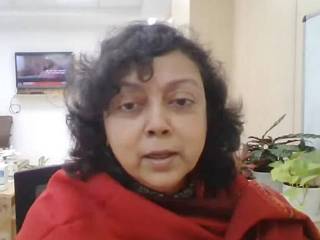
Parts of NCERT textbooks, particularly those dealing with history, have been “criticised” because they offer “opinions or arguments” and are “not entirely based on facts”, Anita Karwal, Secretary, Department of School Education and Literacy, is learnt to have said during a national consultation on curriculum revision held Monday.
Karwal, former CBSE chairperson and the most senior government official heading school education, said the country’s education system currently does not equip a child with skills to distinguish between a claim, a fact, an opinion or an argument, aspects which are covered under the Programme for International Student Assessment (PISA) in which India also participates.
“When we are talking about science learning, for example, this is an area where we really need to focus upon, that is the critical thinking area. Whether it is science, whether it is language. In language also, people have been criticising some NCERT texts for certain things that have been written there. And those are actually only opinions or arguments, they are not facts, and that is why they have been criticised. In particular, our history textbooks have been criticised for this. Our history textbooks are not based entirely on facts. They are based on opinions, they are based on arguments. A child should be able to distinguish between all this and come to a conclusion before releasing the internal conflict in society, this is something we all need to be very careful about,” Karwal is learnt to have said.
The remarks were made during a day-long interaction of 25 groups of experts with the National Steering Committee revising the National Curriculum Framework (NCF). The groups, which represent areas ranging from Knowledge of India to Mathematics Education, have been tasked with preparing position papers, which will inform changes in the curriculum and textbooks, by May 15.
Officials told The Indian Express that Prof (retired) C I Issac, chairperson of the focus group on social sciences, said that history currently taught in schools is “subjective, not objective”. He said the starting point should be reversing the order in which the first Article of the Constitution describes the country’s name.
The first Article of the Constitution states that “India, that is Bharat, shall be a Union of States”.
“In the tender minds, we must teach them first Bharat, then India. Instead of India alias Bharat as in the Constitution. Social science teaching to tender minds must be creative and positive. Nowadays, our history in school syllabus is subjective, not objective. The Indian defeat, Hindu defeat is the main theme of school syllabus. You can hear about Muhammad Ghori, the victories… we may say Alexander the Great, who made him great? Alexander is great to Greek people, is it to India or Bharatiya people? So these problems we have discussed (in meetings of the focus group on social science),” he said.
The comments of the chairperson are important because the position paper on Knowledge of India will also be followed by other focus groups so that elements of the ancient Indian knowledge system, upon which emphasis has also been put in the National Education Policy 2020, can be integrated across subjects.
Meanwhile, The Kashmir Files film also found mention during the day-long sessions when Professor K Ramasubramanian, from IIT Bombay and a member of a focus group on Knowledge of India, said: “Today morning, I saw a mail where somebody sent a clip of Kashmir Files. What has been done for a long time is suppressing the facts and misportraying, this is what has happened even with respect to knowledge of India. I think this is going to be eliminated is what I strongly feel and we will be extremely careful in formulating what is to be formulated to see that we don’t ever make any statement that is hyperbolic which will be counter-productive,” he said.
The 12-member national steering committee of the NCF revision exercise is headed by former ISRO chief K Kasturirangan. The NCF was last revised in 2005 under the UPA government, and before that in 1975, 1988 and 2000.
Incidentally, in December last year, a Rajya Sabha committee, headed by BJP MP Vinay P Sahasrabuddhe, tabled a report in the House, making a pitch for books “free of biases”, review of the representation of Indian freedom fighters in history textbooks in schools, and recommended that “ancient wisdom and knowledge” from the Vedas be incorporated in the curriculum.
Source : The Indian Express

 NCPCR summons Netflix India over alleged accessibility of sexual contents to minors
NCPCR summons Netflix India over alleged accessibility of sexual contents to minors Maharashtra State Archaeology Department launches website after Hindu Vidhidnya Parishad’s follow up
Maharashtra State Archaeology Department launches website after Hindu Vidhidnya Parishad’s follow up Kalki 2898 AD: Legal notice served to team for allegedly hurting Hindu sentiments
Kalki 2898 AD: Legal notice served to team for allegedly hurting Hindu sentiments NGO worker distributes books on Jesus to the school students in Vidisha (MP)
NGO worker distributes books on Jesus to the school students in Vidisha (MP) Kanwar Yatra: SC stays U.P., Uttarakhand directives to display names of food stall owners and staff en route
Kanwar Yatra: SC stays U.P., Uttarakhand directives to display names of food stall owners and staff en route ASI says ‘parts of pre-existing temples converted into a mosque’ in scientific report on Bhojshala complex
ASI says ‘parts of pre-existing temples converted into a mosque’ in scientific report on Bhojshala complex